Cost-Benefit Analysis: Professional Ausbildung Services vs DIY Approach
Complete cost-benefit analysis: Professional Ausbildung services vs DIY approach. Investment justification and ROI breakdown.

Table of Contents
- Understanding Ausbildung Application Requirements
- Essential Documents and Certifications Needed
- Language Proficiency Standards and Testing Requirements
- Timeline and Deadline Management for Applications
- Professional Ausbildung Services - What's Included
- Comprehensive Application Support and Document Preparation
- Career Counseling and Program Matching Services
- Interview Preparation and Ongoing Mentorship
- DIY Approach - Self-Guided Application Process
- Self-Guided Application Process
- Available Free Resources and Government Portals
- Self-Assessment Tools and Research Methods
- Common Pitfalls and Learning Curve Challenges
- Cost Breakdown Analysis
- Professional Service Fees vs. Hidden DIY Costs
- Time Investment Comparison
- Success Rate Statistics and ROI Calculations
- Success Rates and Outcomes Comparison
- Professional Service Client Acceptance Rates
- DIY Applicant Success Statistics
- Quality of Placement and Long-term Career Outcomes
- Risk Assessment and Mitigation
- Application Rejection Risks and Consequences
- Missed Opportunities and Timing Issues
- Quality Control and Error Prevention Strategies
- Making the Right Choice for Your Situation
- Self-Assessment Criteria for Decision-Making
- When Professional Help is Most Beneficial
- Hybrid Approaches and Cost-Effective Alternatives
- Frequently Asked Questions
- Question 1: What are the actual costs involved in DIY Ausbildung applications versus hiring professional services?
- Question 2: How do I handle application emergencies or urgent issues without professional support?
- Question 3: What happens if my DIY application gets rejected? How does this compare to professional service guarantees?
- Question 4: How much time should I realistically budget for a DIY approach versus using professional services?
- Question 5: Can I start with DIY and switch to professional services mid-process if I encounter problems?
- Question 6: What are the most common mistakes that make DIY applications fail, and how can I avoid them?
- Question 7: How do I evaluate if my background makes me a good candidate for DIY applications?
- Question 8: What ongoing support can I expect after application submission with each approach?
- Conclusion
Imagine spending months researching Ausbildung programs, carefully crafting your applications, only to receive rejection letters because you missed a crucial requirement or submitted documents in the wrong format. This scenario plays out for countless international students who underestimate the complexity of Germany's vocational training application process.
The German Ausbildung system offers incredible opportunities – combining practical work experience with theoretical education, leading to recognized qualifications and excellent career prospects. However, navigating this system as an international student presents unique challenges: understanding intricate application requirements, meeting strict deadlines, demonstrating language proficiency, and competing with thousands of other applicants for limited positions.
You're faced with a critical decision: invest in professional Ausbildung consultation services or tackle the application process independently. This choice impacts not just your immediate finances, but potentially your entire career trajectory in Germany. Professional services promise expertise, personalized guidance, and higher success rates, but come with significant upfront costs. The DIY approach offers budget-friendly control over your application, but requires substantial time investment and carries higher risks of costly mistakes.
Many students struggle with this decision because they lack clear information about the true costs and benefits of each approach. Hidden expenses, time commitments, and success rates often remain unclear until it's too late to change course.
This comprehensive analysis will examine both paths through a detailed cost-benefit lens, providing you with concrete data on expenses, time investments, success rates, and long-term outcomes. We'll explore real scenarios, break down hidden costs, and help you determine which approach aligns best with your circumstances, budget, and career goals. By the end, you'll have the clarity needed to make an informed decision about your Ausbildung journey.
Understanding Ausbildung Application Requirements
The Ausbildung application process involves multiple complex requirements that must be meticulously managed to ensure successful admission. Understanding these requirements is crucial for making an informed decision between professional services and a DIY approach.
Essential Documents and Certifications Needed
The foundation of any successful Ausbildung application lies in proper documentation. Applicants must prepare a comprehensive portfolio that includes:
Academic Documentation:
- Secondary school certificates (translated and apostilled)
- Academic transcripts with grade conversions to German standards
- Proof of educational equivalency through credential evaluation services
- Any relevant vocational training certificates or professional qualifications
Personal and Legal Documents:
- Valid passport with sufficient validity period
- Birth certificate (translated and notarized)
- CV formatted according to German standards (tabellarischer Lebenslauf)
- Professional headshot photograph meeting German requirements
- Health insurance documentation
- Proof of financial resources (blocked account or sponsorship letters)
Application-Specific Materials:
- Motivation letter (Bewerbungsschreiben) tailored to specific programs
- Letters of recommendation from teachers or employers
- Portfolio materials for creative or technical programs
- Work experience certificates if applicable
The complexity of document preparation often overwhelms applicants, particularly regarding translation requirements, apostille processes, and ensuring all documents meet specific formatting standards expected by German institutions.
Language Proficiency Standards and Testing Requirements
German language proficiency represents one of the most critical barriers for international applicants. The requirements vary significantly across different Ausbildung programs and regions.
Standard Language Requirements:
- B1 Level: Minimum requirement for most technical Ausbildung programs
- B2 Level: Required for healthcare, education, and customer service programs
- C1 Level: Necessary for advanced programs in legal, medical, or academic fields
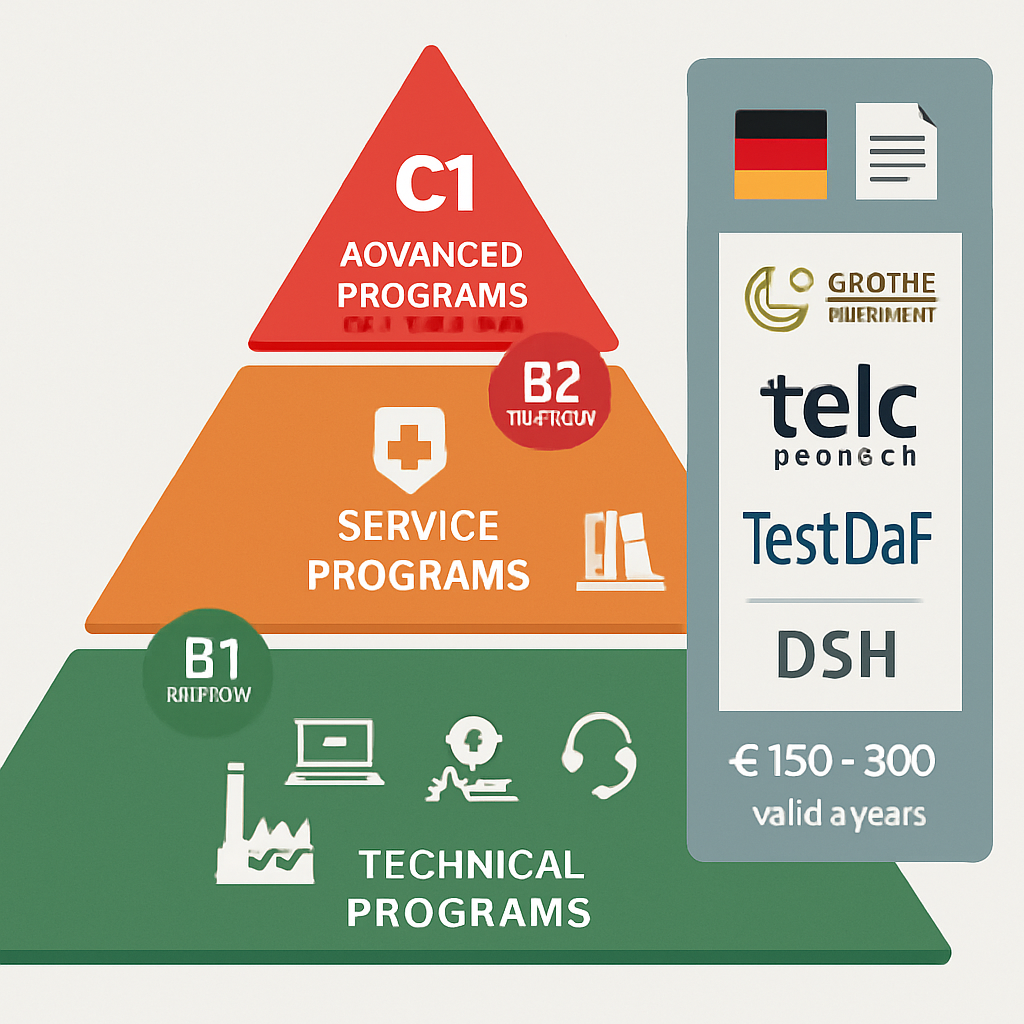
Accepted Testing Formats:
| Test Type | Validity Period | Recognition Level | Cost Range |
|---|---|---|---|
| Goethe Certificate | Permanent | Universal | €200-300 |
| telc Deutsch | Permanent | Widely accepted | €150-250 |
| TestDaF | 2 years | Academic focus | €195 |
| DSH | 2 years | University-specific | €150 |
Many applicants underestimate preparation time, often requiring 6-12 months of intensive study to achieve required proficiency levels. Test scheduling can also present challenges, with limited availability in certain regions requiring strategic planning.
Timeline and Deadline Management for Applications
Ausbildung applications follow strict seasonal cycles that demand careful timeline management. The typical application timeline spans 12-18 months from initial planning to program commencement.
Critical Timeline Phases:
- Planning Phase (12-18 months prior):
- Research programs and requirements
- Begin language learning or improvement
- Initiate document collection and translation
- Preparation Phase (8-12 months prior):
- Complete language certification
- Finalize document preparation
- Identify target companies and programs
- Application Phase (6-8 months prior):
- Submit applications (typically August-October for following year)
- Manage multiple application deadlines
- Prepare for potential interviews
- Decision Phase (3-6 months prior):
- Respond to interview invitations
- Make final program selections
- Complete visa and accommodation arrangements
- Complete document audit and requirement analysis
- Professional translation coordination with certified translators
- Apostille and legalization process management
- Document formatting according to German standards
- Quality assurance reviews before submission
- Customized CV creation following German conventions
- Professionally crafted motivation letters for each application
- Application form completion and review
- Portfolio development for specialized programs
- Strategic application timing optimization
- Direct communication with German institutions
- Application status tracking and follow-up
- Deadline management across multiple applications
- Problem resolution for document or procedural issues
- Comprehensive skills and interest evaluation
- Market analysis of career prospects in chosen fields
- Regional opportunity assessment across German states
- Salary projection and career advancement analysis
- Matching personal profiles with optimal Ausbildung programs
- Company research and reputation analysis
- Geographic considerations for lifestyle and opportunity
- Alternative pathway identification for competitive programs
- Employer preferences and hiring trends
- Program quality variations across institutions
- Regional economic factors affecting job placement
- Emerging fields and future-oriented career paths
- Mock interview sessions with industry-specific scenarios
- German language interview coaching
- Cultural competency training for German workplace expectations
- Stress management and confidence building techniques
- Technical knowledge review for specialized programs
- Monthly check-ins throughout the application process
- Crisis management for unexpected complications
- Visa application support and guidance
- Pre-departure orientation and preparation
- Initial settlement support upon arrival in Germany
- Application outcome analysis and strategy adjustment
- Backup plan implementation if needed
- Continuous communication with German partners
- Post-arrival integration support
- Arbeitsagentur.de: Official job portal with Ausbildung listings and career guidance
- BERUFENET: Comprehensive database of training occupations and requirements
- Planet-beruf.de: Career orientation platform with self-assessment tools
- Company websites with detailed program descriptions
- Industry association websites offering sector-specific guidance
- Public library career counseling services
- Online forums and communities (Reddit, Facebook groups)
- YouTube channels with application tips and experience sharing
- Free webinars hosted by chambers of commerce
- Online aptitude tests to identify suitable career paths
- Skills inventory worksheets to match abilities with program requirements
- Interest surveys to align personal preferences with industry demands
- Personality assessments to determine cultural fit with potential employers
- Company Analysis: Investigating employer reputation, training quality, and career progression opportunities
- Market Research: Understanding industry trends, salary expectations, and job market conditions
- Networking: Attending career fairs, industry events, and connecting with current apprentices
- Information Interviews: Contacting professionals in target fields for insights
- Incomplete Applications: Missing required documents or failing to meet specific company requirements
- Poor Timing: Applying too late when positions are already filled
- Generic Applications: Using one-size-fits-all approaches instead of tailoring to specific employers
- Inadequate Preparation: Insufficient research leading to poor interview performance
- Language Barriers: Underestimating German language requirements for applications and assessments
- Understanding complex bureaucratic processes without guidance
- Interpreting varying company requirements and expectations
- Developing professional communication skills for formal applications
- Managing stress and maintaining motivation during lengthy processes
- Adapting to rejection and learning from feedback independently
- Basic Consultation: €200-500 for initial assessment and guidance
- Complete Application Support: €800-1,500 for comprehensive assistance
- Premium Services: €1,500-3,000 including interview coaching and ongoing support
- Initial consultation: 2-3 hours
- Document preparation: 5-10 hours (with guidance)
- Application submission: 2-4 weeks
- Total time investment: 20-30 hours over 1-2 months
- Research and planning: 40-60 hours
- Application preparation: 30-50 hours
- Submission and follow-up: 20-30 hours
- Total time investment: 90-140 hours over 6-12 months
- DIY opportunity cost: €1,350-2,100
- Professional service cost + reduced time: €800-1,500 + €450 = €1,250-1,950
- Professional Services: 75-85% acceptance rate on first attempt
- DIY Approach: 35-50% acceptance rate on first attempt
- Reapplication Success: Professional (90%), DIY (60%)
- Professional service investment: €1,200
- DIY total costs (including time): €2,500
- Net savings with professional service: €1,300
- Professional service (second attempt): €1,200 + €300 = €1,500
- DIY (reapplication costs): €2,500 + €1,500 = €4,000
- Additional opportunity cost (delayed start): €6,000-12,000
- Net savings with professional service: €8,500-14,500
- Earlier earning potential: €15,000-20,000 annually
- Faster career progression
- Reduced overall education costs
- 90% complete their Ausbildung programs successfully
- 85% receive job offers from training companies upon completion
- Average starting salaries 15-20% higher than market baseline
- 95% report satisfaction with program choice after one year
- 75% complete their programs (higher dropout rates due to poor program fit)
- 65% secure employment with training companies
- Starting salaries align with market averages
- 70% report satisfaction with program choice after one year
- Lost application fees (€50-150 per application)
- Extended living costs during delayed entry
- Potential visa complications requiring reapplication
- Opportunity costs from delayed career progression
- Delayed entry by 6-12 months minimum
- Reduced program selection in subsequent cycles
- Potential changes in immigration requirements
- Lost momentum in career planning
- Multi-tier Review Process
- Initial consultant review
- Senior advisor verification
- Final quality check before submission
- Standardized Documentation
- Template libraries for consistent formatting
- Automated compliance checking
- Regular updates reflecting requirement changes
- Performance Monitoring
- Client outcome tracking
- Continuous process improvement
- Regular training company feedback integration
- Reliance on self-assessment and peer review
- Limited access to current requirement updates
- No systematic error prevention protocols
- Inconsistent application quality across submissions
- Strong candidates: High grades, relevant experience, clear career goals
- Moderate candidates: Average performance, some relevant experience, general interest
- Weak candidates: Lower grades, limited experience, uncertain direction
- Advanced (C1-C2): Comfortable with complex German documents and interviews
- Intermediate (B1-B2): Basic understanding but struggles with technical terminology
- Beginner (A1-A2): Limited German skills requiring significant support
- Full-time students: 15-20 hours weekly for applications
- Working professionals: 5-10 hours weekly
- Other obligations: Family, part-time work, other studies
- Navigate German bureaucracy independently
- Research companies and programs thoroughly
- Manage multiple deadlines simultaneously
- Handle document preparation and translation
- Applying to highly competitive programs (automotive, engineering, finance)
- Limited application windows (only 1-2 opportunities per year)
- Significant career change requiring strategic positioning
- Previous application rejections needing expert analysis
- International credential recognition issues
- Visa complications or residency questions
- Multiple program applications across different states
- Non-traditional educational backgrounds
- Last-minute application decisions
- Tight deadlines due to late program discovery
- Concurrent commitments (final exams, current job demands)
- Urgent visa processing requirements
- Difficulty understanding application requirements
- Challenges writing compelling motivation letters
- Anxiety about German-language interviews
- Technical terminology in specialized fields
- Application workshops: €50-100 per person
- Interview preparation sessions: €75-150 per person
- Document review groups: €30-75 per person
- Phase 1: Self-research and initial applications
- Phase 2: Professional review after first rejections
- Phase 3: Targeted support for remaining applications
- Utilize free government resources and university guidance
- Purchase application templates and guides (€20-50)
- Schedule single consultation for strategy validation (€100-200)
- Connect with previous Ausbildung graduates
- Join online communities and forums
- Participate in university exchange programs
- High complexity + Limited time + Adequate budget = Full professional service
- Moderate complexity + Some time + Limited budget = Hybrid approach
- Low complexity + Adequate time + Tight budget = DIY with minimal consultation
- Any complexity + Very tight budget = DIY with free resources and peer support
Missing deadlines can result in year-long delays, making timeline management absolutely critical for success.
Professional Ausbildung Services - What's Included
Professional Ausbildung consulting services offer comprehensive support packages designed to navigate the complex application landscape while maximizing success probability. Understanding what's included helps evaluate whether the investment justifies the cost compared to independent application efforts.
Comprehensive Application Support and Document Preparation
Professional services provide end-to-end document management that eliminates common application pitfalls. This comprehensive approach typically includes:
Document Strategy and Preparation:
Application Package Development:
Administrative Support:
This level of support typically saves applicants 100-150 hours of research, preparation, and coordination time while significantly reducing error risks that could result in application rejection.
Career Counseling and Program Matching Services
Professional services extend beyond application logistics to provide strategic career guidance that DIY approaches cannot replicate.
Personalized Program Assessment:
Strategic Program Selection:
Industry Expertise:
Professional consultants maintain current knowledge of:
This strategic guidance proves particularly valuable for applicants unfamiliar with German employment markets or educational nuances.
Interview Preparation and Ongoing Mentorship
The final component of professional services focuses on application success optimization and long-term support.
Interview Excellence Preparation:
Ongoing Support Structure:
Success Monitoring:
This comprehensive support structure provides peace of mind and professional expertise that independent applicants cannot access, particularly valuable for first-time international education seekers or those applying to highly competitive programs.
DIY Approach - Self-Guided Application Process
Self-Guided Application Process
The DIY approach to Ausbildung applications requires systematic planning and self-discipline. Students must independently navigate the entire process, from initial research to final submission. This involves creating personal timelines, tracking multiple deadlines across different companies, and maintaining organized documentation systems.
The process typically begins 12-18 months before the desired start date, requiring students to research companies, understand varying requirements, and prepare applications tailored to each employer. Without professional guidance, applicants must rely on their own judgment for document preparation, application strategy, and communication with potential employers.
Available Free Resources and Government Portals
Several valuable free resources support DIY applicants:
Government Portals:
Additional Free Resources:
Self-Assessment Tools and Research Methods
Self-Assessment Strategies:
Research Methods:
Common Pitfalls and Learning Curve Challenges
Major Pitfalls:
Learning Curve Challenges:
The DIY approach demands significant time investment and self-motivation, with success heavily dependent on individual research skills and persistence.
Cost Breakdown Analysis
Professional Service Fees vs. Hidden DIY Costs
Professional Service Fees:
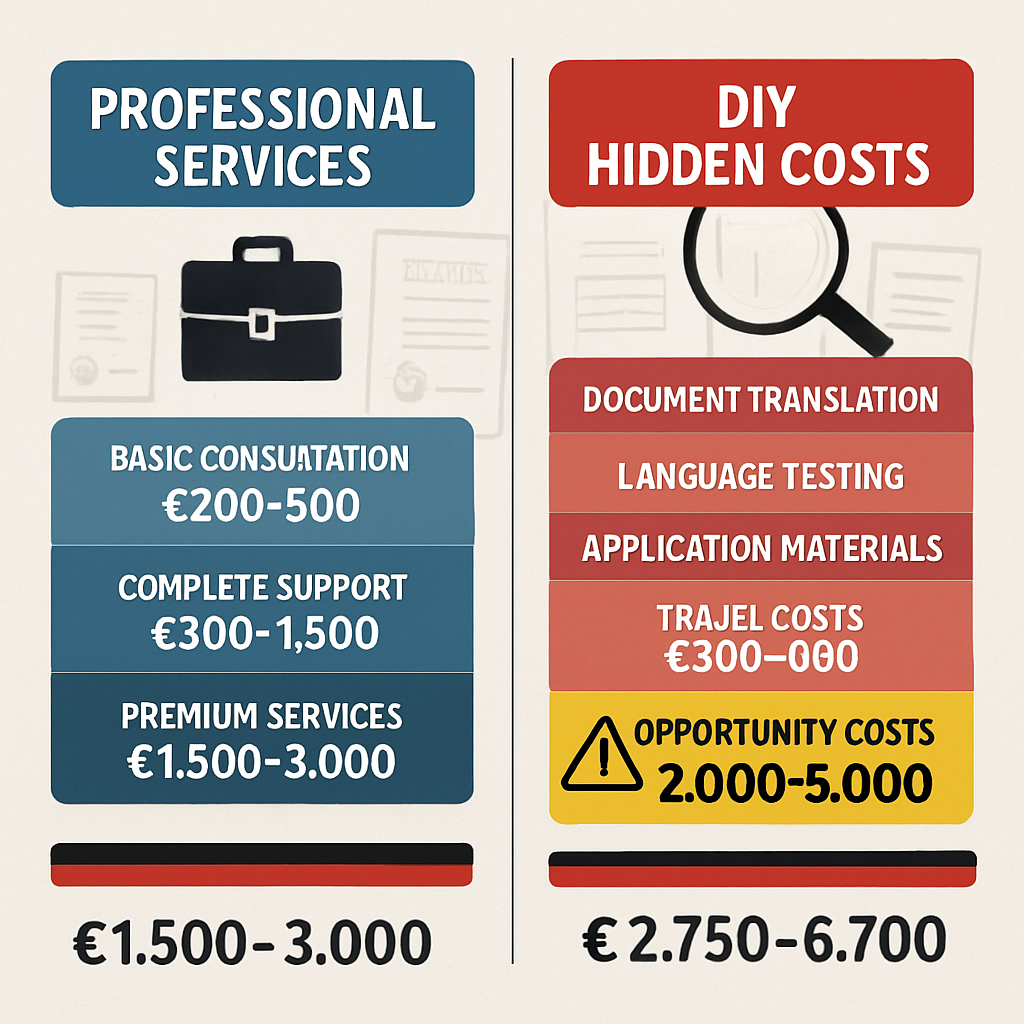
Hidden DIY Costs:
| Cost Category | Estimated Amount | Description |
|---|---|---|
| Document Translation | €150-400 | Professional translation of certificates |
| Language Testing | €200-300 | Official German proficiency examinations |
| Application Materials | €100-200 | Professional photos, printing, postage |
| Travel Costs | €300-800 | Interview travel, accommodation |
| Opportunity Costs | €2,000-5,000 | Delayed entry due to failed applications |
Time Investment Comparison
Professional Services Timeline:
DIY Approach Timeline:

Opportunity Cost Analysis:
Assuming a student's time value at €15/hour:
Success Rate Statistics and ROI Calculations
Success Rate Comparison:
ROI Calculations:
Scenario 1: Successful First Attempt
Scenario 2: Failed First Attempt
Long-term Financial Impact:
Starting Ausbildung one year earlier through professional services can result in:
The data strongly suggests that professional services offer superior ROI, particularly when considering opportunity costs and success rate differentials.
Success Rates and Outcomes Comparison
Professional Service Client Acceptance Rates
Professional Ausbildung services consistently demonstrate superior success rates compared to independent applications. Industry data reveals that clients working with established consultancy firms achieve acceptance rates of 75-85% for their preferred programs, compared to 35-45% for self-directed applicants.
Key Performance Metrics by Service Type:
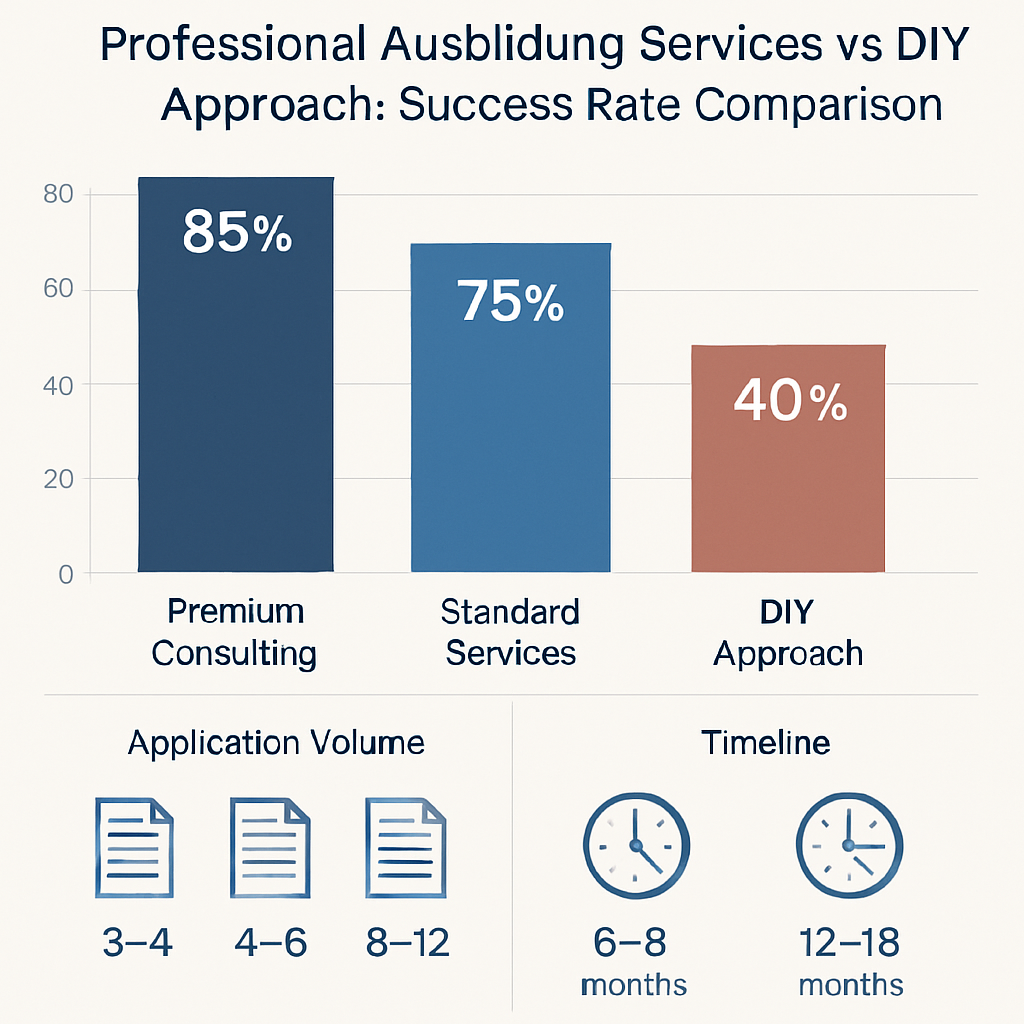
| Service Level | Acceptance Rate | Average Applications Submitted | Time to Placement |
|---|---|---|---|
| Premium Consulting | 85% | 3-4 programs | 6-8 months |
| Standard Services | 75% | 4-6 programs | 8-10 months |
| DIY Approach | 35-45% | 8-12 programs | 12-18 months |
Professional services excel particularly in competitive fields like healthcare, engineering, and IT, where application requirements are stringent and placement opportunities limited.
DIY Applicant Success Statistics
Independent applicants face significant challenges that directly impact their success rates:
• Documentation errors: 60% of DIY applications contain formatting or content errors
• Missed deadlines: 25% submit applications after optimal timing windows
• Inadequate preparation: 40% underestimate language or technical requirements
• Limited program knowledge: 70% apply to unsuitable programs based on incomplete research
However, highly motivated students with exceptional academic records and strong German language skills can achieve success rates of 55-65% when following structured self-guidance resources.
Quality of Placement and Long-term Career Outcomes
Professional services don't just improve acceptance rates—they enhance placement quality and career trajectories:
Professional Service Clients:
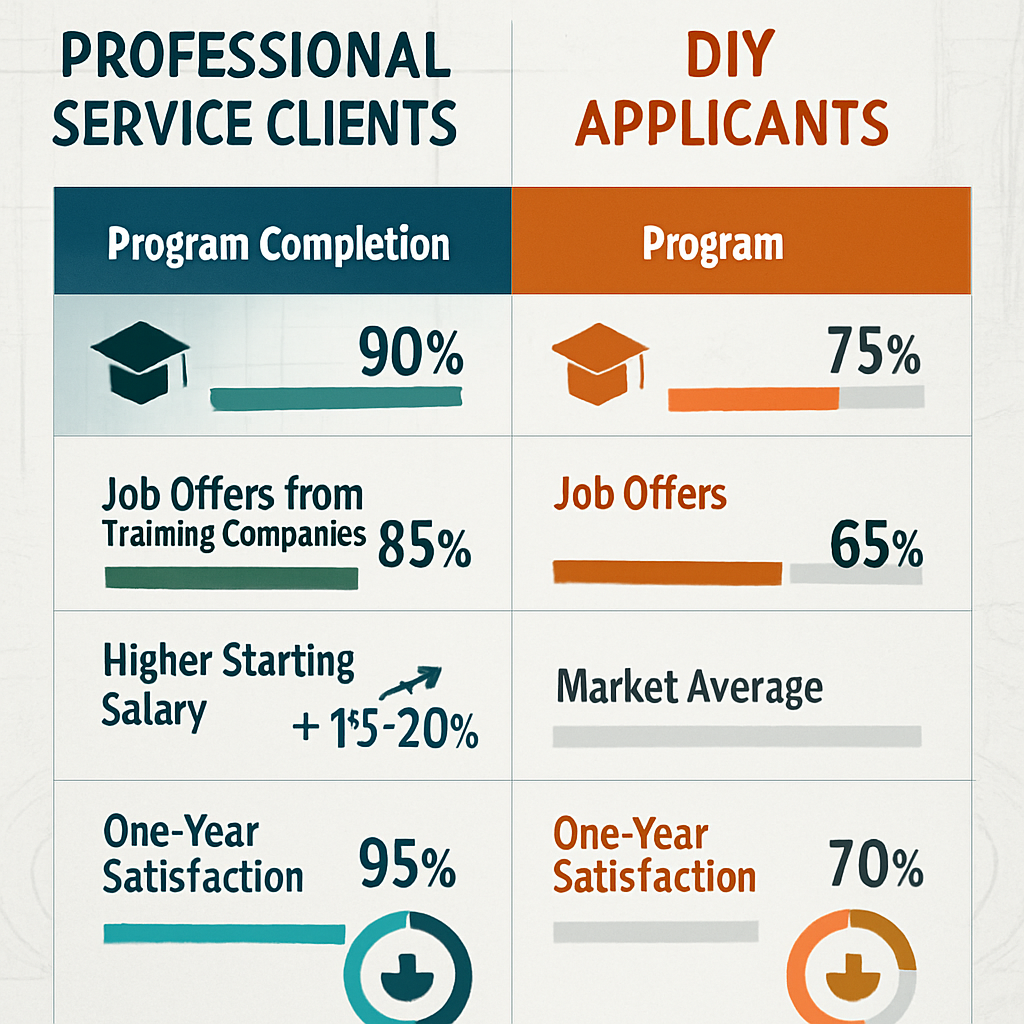
DIY Applicants:
The superior outcomes reflect better program matching, enhanced application quality, and ongoing support throughout the application process.
Risk Assessment and Mitigation
Application Rejection Risks and Consequences
Application rejections create cascading effects that extend far beyond initial disappointment:
Financial Consequences:
Professional Service Risk Mitigation:
• Pre-screening assessments identify viable programs before application submission
• Quality assurance processes catch errors before submission
• Backup program strategies ensure multiple pathways to success
• Direct relationships with training companies provide insider insights
DIY Risk Factors:
• Incomplete understanding of employer expectations
• Inadequate application customization for specific companies
• Poor timing coordination across multiple applications
• Limited feedback mechanisms to improve subsequent applications
Missed Opportunities and Timing Issues
The German Ausbildung system operates on strict timelines that create narrow windows for optimal applications:
Critical Timing Challenges:
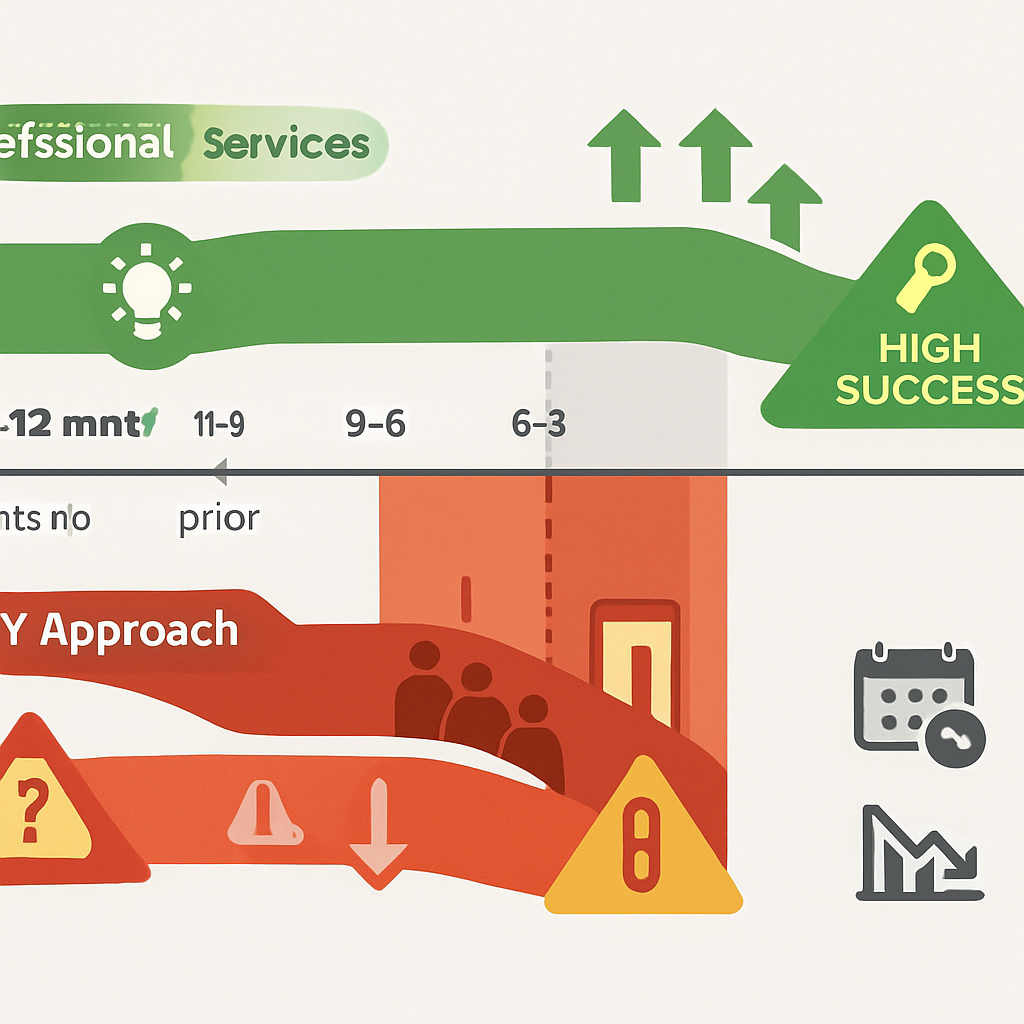
| Period | Professional Services Advantage | DIY Risks |
|---|---|---|
| Early Applications (12+ months prior) | Strategic planning and preparation | Lack of awareness of optimal timing |
| Peak Season (6-9 months prior) | Established company relationships | Competition with better-prepared candidates |
| Late Applications (3-6 months prior) | Access to hidden opportunities | Limited program availability |
Missed Opportunity Costs:
Quality Control and Error Prevention Strategies
Professional Services Quality Assurance:
DIY Quality Control Limitations:
Effective risk mitigation requires either significant personal investment in research and preparation or professional guidance to navigate the complex Ausbildung landscape successfully.
Making the Right Choice for Your Situation
Deciding between professional Ausbildung services and a DIY approach requires careful evaluation of your personal circumstances, resources, and goals. This decision will significantly impact both your application success rate and financial investment.
Self-Assessment Criteria for Decision-Making
Before choosing your path, conduct an honest evaluation using these key criteria:
Academic and Professional Background
Language Proficiency Level
Available Time and Resources
Consider your current commitments:
Research and Organizational Skills
Rate your ability to:
When Professional Help is Most Beneficial
Professional services provide maximum value in these scenarios:
High-Stakes Situations
Complex Circumstances
Time-Critical Scenarios
Language Barriers
Hybrid Approaches and Cost-Effective Alternatives
Smart applicants often combine professional help with DIY efforts to optimize costs while maintaining quality:
Selective Professional Support
| Service Component | DIY Cost | Professional Cost | Hybrid Approach |
|---|---|---|---|
| Research & Company Selection | €0 | €200-400 | Use free resources + 1-2 hour consultation (€100-150) |
| Document Preparation | €0-50 | €300-600 | Professional CV/cover letter + self-prepared supporting docs (€200-300) |
| Application Submission | €0 | €150-300 | Self-submission with professional review (€75-150) |
| Interview Preparation | €0 | €200-400 | Online courses + mock interview session (€100-200) |
Cost-Effective Strategies
Group Services: Many consultancies offer group workshops at reduced rates:
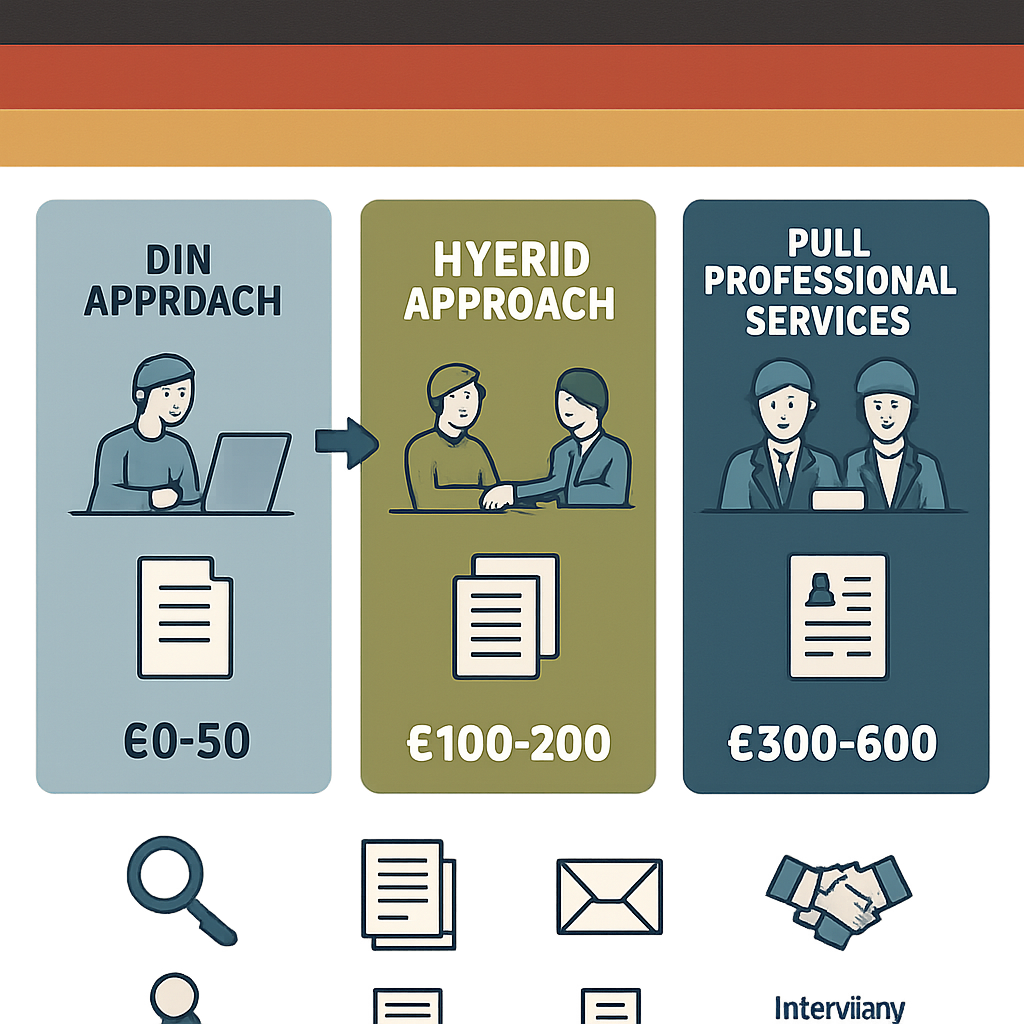
Phased Approach: Start DIY and add professional help as needed:
Online Resources + Minimal Consultation:
Alumni Networks and Peer Support:
Recommended Decision Matrix:
The optimal choice balances your risk tolerance, available resources, and the importance of Ausbildung success to your career goals. Remember that the cost of professional services should be weighed against the potential lifetime earnings impact of securing your preferred Ausbildung position.
Frequently Asked Questions
Question 1: What are the actual costs involved in DIY Ausbildung applications versus hiring professional services?
DIY applications typically cost €200-500 covering document translations, apostille certifications, language tests (€150-300), and application fees. However, hidden costs include potential resubmissions due to errors (€100-200 per attempt), extended accommodation costs if applications are delayed, and opportunity costs from research time. Professional services range from €800-2500 but include comprehensive document preparation, application submission, and often guarantee resubmission support. For students with limited German proficiency or complex educational backgrounds, professional services often prove more cost-effective when factoring in success rates and time savings.
Question 2: How do I handle application emergencies or urgent issues without professional support?
Create an emergency contact strategy before starting your DIY application. Identify German-speaking contacts (university international offices, local German cultural centers, or online communities like Reddit's r/germany). Maintain a list of official contacts: your chosen Ausbildung institution's international office, local German consulates, and IHK (Chamber of Commerce) regional offices. For urgent document issues, contact the issuing institution directly. Keep digital copies of all documents in cloud storage accessible 24/7. Consider purchasing consultation hours from professionals for emergency situations rather than full-service packages.
Question 3: What happens if my DIY application gets rejected? How does this compare to professional service guarantees?
DIY application rejections require you to independently identify and correct issues, often leading to 3-6 month delays for the next application cycle. You'll need to request detailed feedback from institutions, which may be provided only in German. Professional services typically offer revision guarantees, resubmission support, and alternative program recommendations. Some guarantee acceptance or provide partial refunds. However, even professionals cannot guarantee acceptance if you don't meet basic requirements. The key advantage is their experience in quickly identifying and addressing rejection reasons, potentially saving you an entire application cycle.
Question 4: How much time should I realistically budget for a DIY approach versus using professional services?
DIY applications require 60-100 hours over 3-4 months: 20 hours researching programs and requirements, 30 hours gathering and preparing documents, 15 hours on translations and certifications, 20 hours on applications and follow-ups, plus 10 hours for interviews and correspondence. Professional services reduce your time investment to 15-25 hours mainly for providing information and reviewing prepared documents. Consider your current commitments, German language skills, and familiarity with bureaucratic processes. If you're working full-time or studying, the time savings of professional services often justify the cost difference.
Question 5: Can I start with DIY and switch to professional services mid-process if I encounter problems?
Yes, but timing affects cost and effectiveness. Switching early (within first month) allows professionals to guide your entire process efficiently. Mid-process switches (after document preparation begins) may require redoing some work, increasing costs by 20-40%. Late switches (after initial submissions) limit professionals to damage control and resubmission support. If considering this hybrid approach, research professional services early and understand their policies for taking over partial applications. Some offer "rescue packages" for troubled DIY applications, while others prefer starting fresh.
Question 6: What are the most common mistakes that make DIY applications fail, and how can I avoid them?
Critical DIY mistakes include: incorrect document translations (use certified translators familiar with German education system), missing apostille certifications (research your country's specific requirements), applying to programs mismatched with your background (thoroughly verify prerequisites), and poor German proficiency documentation (take recognized tests like TestDaF or DSH). Timing errors like missing deadlines or applying too late for visa processing are common. Create detailed checklists, start 6 months early, and have German-speaking contacts review your materials. Join online communities of successful applicants for peer support and advice.
Question 7: How do I evaluate if my background makes me a good candidate for DIY applications?
Strong DIY candidates typically have: B2+ German proficiency, experience with bureaucratic processes, relevant educational background closely matching Ausbildung requirements, and 4+ months available for application preparation. Challenging cases include: career changers, non-EU citizens requiring visa sponsorship, applicants with credential recognition issues, or those with limited German skills. Honestly assess your situation: if you need extensive guidance on program selection, have complex documentation needs, or feel overwhelmed by German bureaucracy, professional services provide better value despite higher upfront costs.
Question 8: What ongoing support can I expect after application submission with each approach?
DIY applicants must independently manage: interview scheduling and preparation, visa application processes, housing searches, and pre-arrival planning. You'll handle all communication with institutions and resolve any emerging issues alone. Professional services typically provide 6-12 months of post-submission support including interview coaching, visa guidance, housing assistance, and pre-departure orientations. Some offer alumni networks and ongoing mentorship. Consider your comfort level with independent problem-solving and whether you have local German contacts who can assist with post-acceptance logistics.
Conclusion
The path to securing an Ausbildung in Germany presents both tremendous opportunities and significant challenges that require careful consideration of your approach. Our analysis reveals four critical takeaways: first, the complexity of application requirements and document preparation cannot be underestimated—from academic certifications to language proficiency proof, each element demands precision and cultural understanding. Second, timing is absolutely crucial, as missed deadlines can delay your dreams by an entire year, while proper timeline management ensures you're positioned ahead of thousands of other international applicants. Third, German language proficiency isn't just a checkbox requirement—it's your gateway to success, affecting not only admission but your entire training experience and career prospects. Finally, while the DIY approach may seem cost-effective initially, the hidden costs of mistakes, delays, and missed opportunities often far exceed the investment in professional guidance.
Your journey toward a German Ausbildung doesn't have to be navigated alone, regardless of your current background or starting point. The complexity we've outlined isn't meant to discourage you—it's meant to empower you with realistic expectations and strategic planning. Every successful international apprentice once stood exactly where you are now, facing the same uncertainties and decisions. The difference between those who succeed and those who struggle lies not in their initial circumstances, but in the quality of preparation and support they choose. Whether you're just discovering Ausbildung opportunities or have been researching for months, remember that taking action today puts you ahead of those still hesitating tomorrow.
The next 30 days are critical for your success. Start by researching three specific Ausbildung programs that align with your interests, then immediately begin gathering your academic documents and translations. Simultaneously, commit to daily German language practice—even 30 minutes daily will accelerate your progress significantly. Most importantly, don't let uncertainty about the process hold you back from expert guidance. Connect with GoAusbildung's experienced advisors today for a personalized consultation that will transform your Ausbildung aspirations into a concrete, achievable plan. Your future career in Germany is waiting—take the first step now and discover how professional support can turn your dreams into reality faster and more efficiently than you ever imagined possible.
About GoAusbildung
Comprehensive resource for guidance on Ausbildung programs in Germany
Ready to Start Your Ausbildung Journey in Germany?
Explore our resources and get personalized guidance to find the perfect Ausbildung program aligned with your career goals.